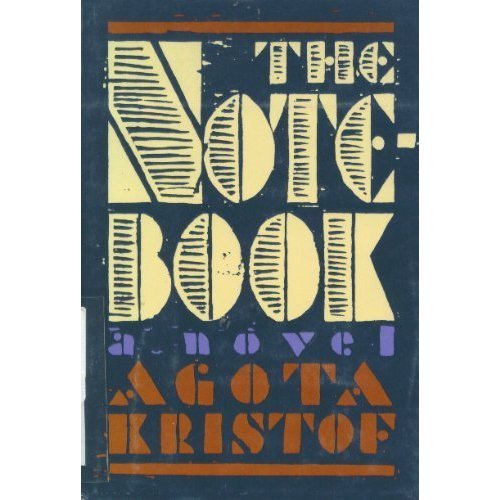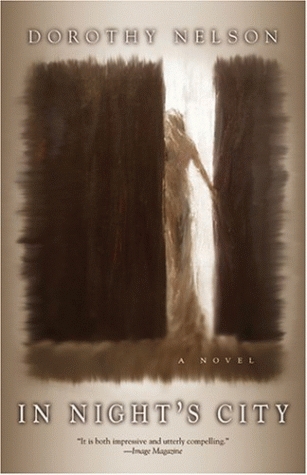
In this series, Noah Charney asks an author to choose a favorite novel that he or she thinks is a hidden gem, deserving of more attention.
Noah Charney talks to Eimear McBride about Agota Kristof’s The Notebook.
When Slavoj Zizek writes of a book that, “awoke in [him] a cruel and cold passion,” attention is due. And when a novelist of the talents of Eimear McBride says to read it, I grab the nearest Kindle and get moving. Agota Kristof’s The Notebook is actually a novella, one of three linked works (along with The Proof and The Third Lie) but it functions perfectly well as a stand-alone book. Set nominally in Kristof’s native post-war Hungary, and originally written in French, The Notebook tells the story of twin boys who are left at their grandmother’s house in the country, very much against the will of all parties. The work is written in a minimalist style, stripped of adjectives and emotion, which is something of a mercy, because horrible things happen here, and thanks to Kristof’s remarkable narrative voice, we are able to approach them. Eimear McBride selected in the first installment of The Believer’s new monthly series, “You Should Really Be Reading This…”
Eimear McBride was born in Liverpool to Irish parents and tore onto the literary scene in 2013, with her acclaimed novel, A Girl is a Half-Formed Thing. Written in six months, it took nine years for the novel to find a publisher, and was finally released by Galley Beggar, a small press in Norwich, England. The novel won her the 2014 Bailey’s Women’s Literature Award and the inaugural Goldsmiths Prize in 2013, sent her on a world tour, and made her a household name among those who love literary fiction. Her novel is written in a stream-of-consciousness that recalls the final chapter of Ulysses, Beckett’s monologues, or Arthur Kopit’s Wings.
Read along with us for next month, when we will speak with Kate Zambreno about A Cannibal and Melancholy Mourning by Catherine Mavrikakis.
—Noah Charney
I. MORE THAN HUMAN
NOAH CHARNEY: Why did you choose The Notebook?
EIMEAR MCBRIDE: It’s a book that I was only introduced to, myself, at the beginning of the year. I was amazed that I had never heard of it before. I found it profoundly disturbing, incredibly well-written, and very brave. And the fact that it was written by a woman—it has a startling brutality and ferocity about the style that I find very inspiring.
NC: The voice is very simple, fairy-tale-like, masking the brutality. What do you feel that narrative choice allows, that another style of writing might not permit? From an author’s perspective, does it let you get away with something more stark and brutal than something that might, for instance, be hyper-realist?
EM: I think it’s a sophisticated technique, and there are not a lot of writers who can do that well. The paired-down style is in fashion, but there aren’t many writers who can make it their own, and make it individual. Kristof really does that. That she strips everything she does of emotion, entirely, and forces these really horrific scenes to be played out in a simple, straightforward, unemotional text makes it doubly powerful.
NC: What struck you about it first about the book? I got a little way in when I realized the story would be of a duel between the twin children and their grandmother, with the fairy-tale allegorical potential that such archetypes can represent.
EM: I think for me, obviously the style, straight away. Very short chapters, almost cinematic. Beginning, middle, close of the scene. Once the twins embarked on this journey to make themselves into these Nietzschean supermen, to transcend their own humanity, that’s when I thought, “My god, there’s something really interesting going on here.” The fact that it’s set in, probably, Hungary, during the transition from one occupation to another, and what that means, how it affected people, how they survived through brutality. How these children tried to make themselves more than human. It was just fascinating.
NC: I haven’t read the other two books that are meant to follow in the trilogy. The Notebook stands alone just fine, but I wonder what the other books bring to the mix, if you have read them.
EM: No I’ve not yet read the other two, but I did read, at the same time, a tiny, forty page memoir called The Illiterate, which is actually a very useful accompaniment to The Notebook. It talks a lot about what it was like to lose your country, lose your language, and have to start from scratch. Kristof said that, for five years, she couldn’t bring herself to write, until she could write well enough in French. It’s also very interesting, that The Notebook was not written in her own language (Hungarian), but French. And it’s not for the reasons that Beckett did it, which were aesthetic, trying to escape the horror of the Irish vernacular, you know. It was completely out of necessity, which I think in part gives it this sense of alienation.
II. AN EMOTIONAL APPROACH TO MORALITY
NC: Slavoj Zizek praised The Notebook for a Guardian series called “A Book That Changed Me.” I was interested in his perspective, that the twins possess “authentic ethical naivety” and are “thoroughly immoral” but in such an open way, without trying to fool anyone, which he feels is a more acceptable form of evil and immorality. What are your thoughts on that?
EM: I don’t really agree with him, that they are immoral. I think they are actually super-moral, their morality exceeds the normal human morality, which is quite often an emotional, rather than an intellectual/ethical approach to morality. They are intensely moral and perform a lot of acts of humanity, are very humane in a lot of ways. They help the girl, Harelip, when they have no cause to [she is abused by a local priest, and the twins blackmail the priest into helping her]. It is interesting that, in that act, when they blackmail the priest who molested her, he eventually regains his own sense of morality by seeing what they have done. He becomes ashamed of what he has done. There’s actually a much more complicated morality at work there.
NC: The twins repeat a mantra a couple of times that they do something, even something morally questionable, because someone “absolutely needs it.” They don’t do deeds for self-serving purposes, but they see the world in terms of needs to be fulfilled. They also distinguish between shame and guilt.
EM: Yes.
NC: They felt shame at watching their grandmother do housework when they were not helping, and that was why they began to do work for her—not because she refused to feed them if they did not help out.
EM: Yeah. This is a good example of the super-morality I mentioned because it’s not their shame which moves them to act. Their shame only serves to awaken them to the knowledge that they have transgressed their own boundaries. Their moral choices are not self-serving but are informed by their self-devised codes of right and wrong. Even when they will have to suffer consequences injurious to themselves, they stick by them.
III. ANOTHER LANGUAGE UNDERNEATH
NC: Were there any other books that you considered before choosing The Notebook?
EM: There is a book, actually, but I didn’t recommend it because I didn’t know if you could get hold of it in the US. You can hardly find it here [in the UK.] It’s a wonderful book called In Night’s City by an Irish writer called Dorothy Nelson. No one around here has ever heard of it or read it. I came across it in an article. It’s incredibly interesting, written in the early 80s and, as far as I know, she only wrote one other book. I’d love to know what happened to her. Again, I only read it recent years and long after I wrote A Girl, but I think there are a lot of scenes that could be in A Girl, the style is so similar. There’s obviously something in the linguistic ether for Irish female writers. It was slightly strange to read it, actually, disconcerting.

NC: There seems to be a certain playfulness and creativity with the English language that Irish authors invoke more than Anglophone authors from other countries. Joyce is the obvious example, but you could talk about Beckett, contemporary authors too. Why is that?
EM: It’s certainly the fact that there is another language underneath [Gaelic]. We all learn it at school. Some of us speak it better than others. But it informs, absolutely, the way we construct sentences. How we arrange the words. There’s a pleasure in constantly making a play between the two languages. That’s why Irish writers are devils for prose. Sometimes they’re slightly incomprehensible to people who don’t have any Irish, because they are playing between the two languages as well. Irish writers have a lot of fun with that.
NC: Could you name one or two contemporary Irish writers who you like particularly?
EM: I think Donal Ryan is doing lovely work at the moment. The Thing about December and The Spinning Heart. Wonderful. A poet called Martin Dyar has a book of poetry I’ve just read called Maiden Names, with quite moving, humorous poems about Irish life. I love one called “Death and the Post Office,” about hiring people to close down rural post offices, and how that is causing the death of local communities.




